Analysis of Symbolic Significance in Kyoko Mori's Silent Spring Essay
VerifiedAdded on 2022/09/26
|5
|1378
|34
Essay
AI Summary
This essay delves into the symbolic significance of the epilogue in Kyoko Mori's *Silent Spring*, focusing on the protagonist Yuki's departure for college and the emotional turmoil it ignites within her family. It examines the themes of death, tradition, and non-conformity, highlighting Yuki's struggles with her mother's death and her defiance of societal expectations. The essay analyzes the symbolic actions of characters like Hanae and Hideki, as well as the impact of cultural norms on Yuki's actions and emotions. The essay references the works of Abel, Belyanina, Brooks, Gale, Jacoby, Nagel, Schwarz, and Zhang to support its arguments, providing a comprehensive understanding of the story's themes and characters within the context of Japanese culture and literature. The essay also explores Yuki’s internal conflicts and her journey toward self-discovery, contrasting her experiences with the traditional roles of women in Japanese society.
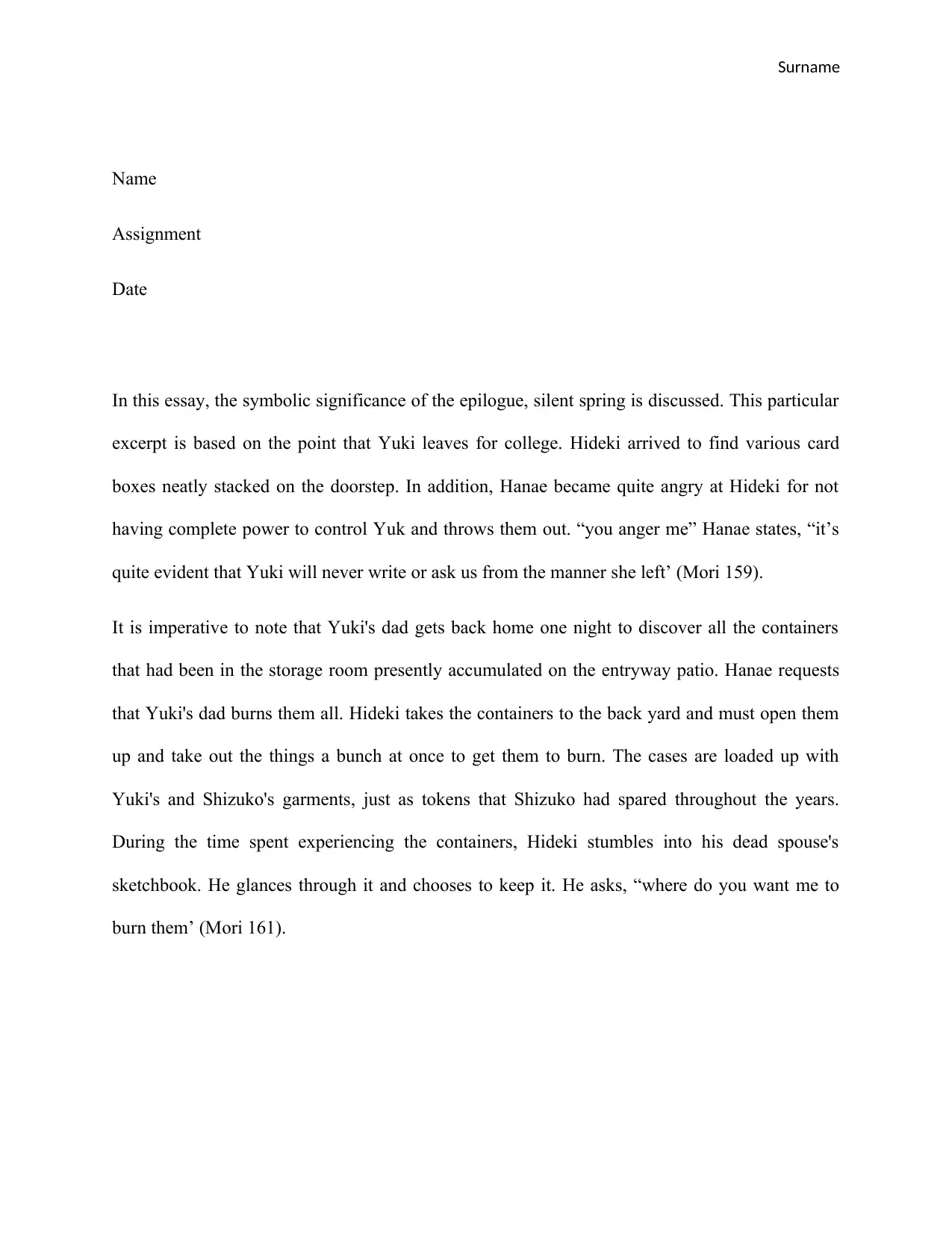
Surname
Name
Assignment
Date
In this essay, the symbolic significance of the epilogue, silent spring is discussed. This particular
excerpt is based on the point that Yuki leaves for college. Hideki arrived to find various card
boxes neatly stacked on the doorstep. In addition, Hanae became quite angry at Hideki for not
having complete power to control Yuk and throws them out. “you anger me” Hanae states, “it’s
quite evident that Yuki will never write or ask us from the manner she left’ (Mori 159).
It is imperative to note that Yuki's dad gets back home one night to discover all the containers
that had been in the storage room presently accumulated on the entryway patio. Hanae requests
that Yuki's dad burns them all. Hideki takes the containers to the back yard and must open them
up and take out the things a bunch at once to get them to burn. The cases are loaded up with
Yuki's and Shizuko's garments, just as tokens that Shizuko had spared throughout the years.
During the time spent experiencing the containers, Hideki stumbles into his dead spouse's
sketchbook. He glances through it and chooses to keep it. He asks, “where do you want me to
burn them’ (Mori 161).
Name
Assignment
Date
In this essay, the symbolic significance of the epilogue, silent spring is discussed. This particular
excerpt is based on the point that Yuki leaves for college. Hideki arrived to find various card
boxes neatly stacked on the doorstep. In addition, Hanae became quite angry at Hideki for not
having complete power to control Yuk and throws them out. “you anger me” Hanae states, “it’s
quite evident that Yuki will never write or ask us from the manner she left’ (Mori 159).
It is imperative to note that Yuki's dad gets back home one night to discover all the containers
that had been in the storage room presently accumulated on the entryway patio. Hanae requests
that Yuki's dad burns them all. Hideki takes the containers to the back yard and must open them
up and take out the things a bunch at once to get them to burn. The cases are loaded up with
Yuki's and Shizuko's garments, just as tokens that Shizuko had spared throughout the years.
During the time spent experiencing the containers, Hideki stumbles into his dead spouse's
sketchbook. He glances through it and chooses to keep it. He asks, “where do you want me to
burn them’ (Mori 161).
Paraphrase This Document
Need a fresh take? Get an instant paraphrase of this document with our AI Paraphraser
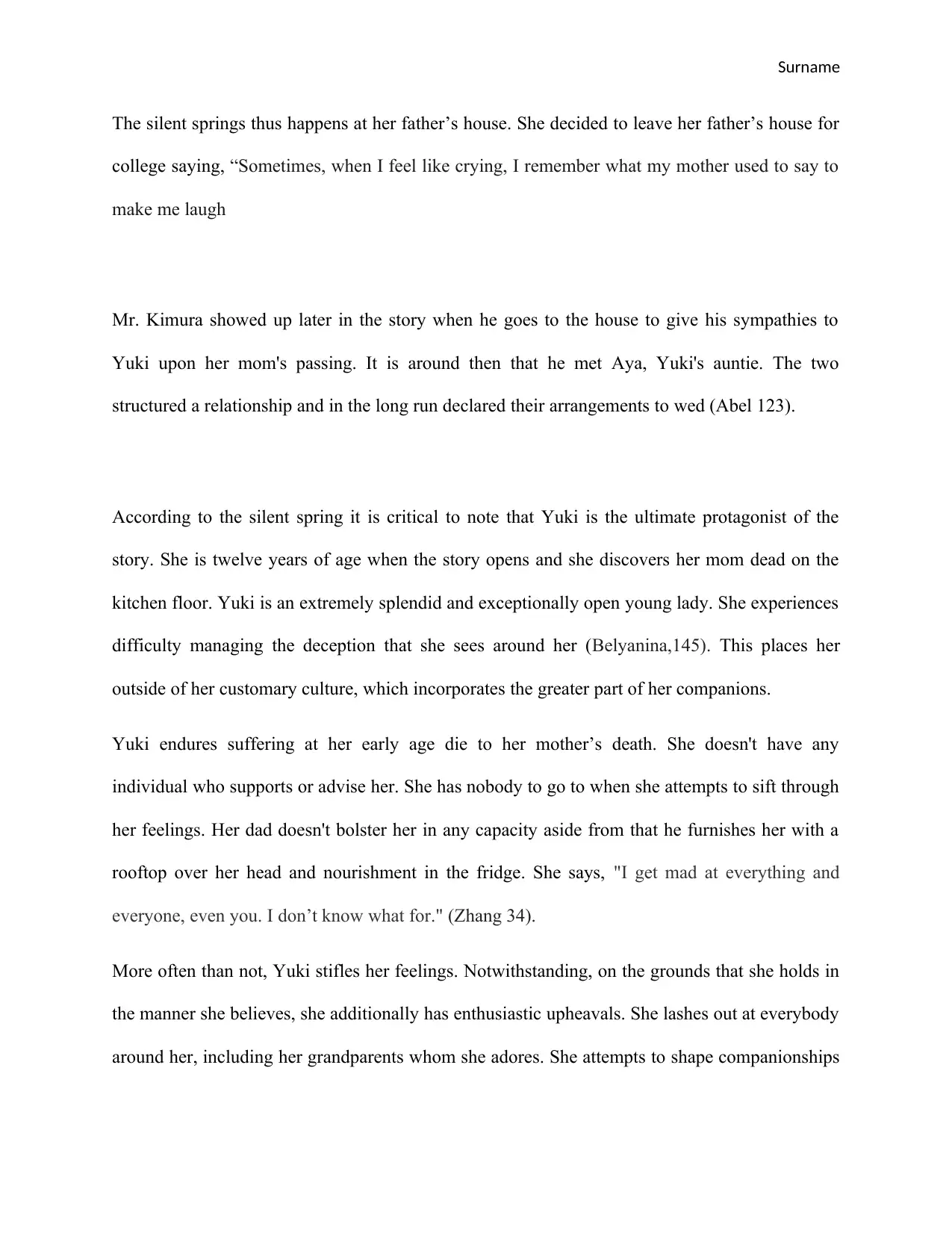
Surname
The silent springs thus happens at her father’s house. She decided to leave her father’s house for
college saying, “Sometimes, when I feel like crying, I remember what my mother used to say to
make me laugh
Mr. Kimura showed up later in the story when he goes to the house to give his sympathies to
Yuki upon her mom's passing. It is around then that he met Aya, Yuki's auntie. The two
structured a relationship and in the long run declared their arrangements to wed (Abel 123).
According to the silent spring it is critical to note that Yuki is the ultimate protagonist of the
story. She is twelve years of age when the story opens and she discovers her mom dead on the
kitchen floor. Yuki is an extremely splendid and exceptionally open young lady. She experiences
difficulty managing the deception that she sees around her (Belyanina,145). This places her
outside of her customary culture, which incorporates the greater part of her companions.
Yuki endures suffering at her early age die to her mother’s death. She doesn't have any
individual who supports or advise her. She has nobody to go to when she attempts to sift through
her feelings. Her dad doesn't bolster her in any capacity aside from that he furnishes her with a
rooftop over her head and nourishment in the fridge. She says, "I get mad at everything and
everyone, even you. I don’t know what for." (Zhang 34).
More often than not, Yuki stifles her feelings. Notwithstanding, on the grounds that she holds in
the manner she believes, she additionally has enthusiastic upheavals. She lashes out at everybody
around her, including her grandparents whom she adores. She attempts to shape companionships
The silent springs thus happens at her father’s house. She decided to leave her father’s house for
college saying, “Sometimes, when I feel like crying, I remember what my mother used to say to
make me laugh
Mr. Kimura showed up later in the story when he goes to the house to give his sympathies to
Yuki upon her mom's passing. It is around then that he met Aya, Yuki's auntie. The two
structured a relationship and in the long run declared their arrangements to wed (Abel 123).
According to the silent spring it is critical to note that Yuki is the ultimate protagonist of the
story. She is twelve years of age when the story opens and she discovers her mom dead on the
kitchen floor. Yuki is an extremely splendid and exceptionally open young lady. She experiences
difficulty managing the deception that she sees around her (Belyanina,145). This places her
outside of her customary culture, which incorporates the greater part of her companions.
Yuki endures suffering at her early age die to her mother’s death. She doesn't have any
individual who supports or advise her. She has nobody to go to when she attempts to sift through
her feelings. Her dad doesn't bolster her in any capacity aside from that he furnishes her with a
rooftop over her head and nourishment in the fridge. She says, "I get mad at everything and
everyone, even you. I don’t know what for." (Zhang 34).
More often than not, Yuki stifles her feelings. Notwithstanding, on the grounds that she holds in
the manner she believes, she additionally has enthusiastic upheavals. She lashes out at everybody
around her, including her grandparents whom she adores. She attempts to shape companionships
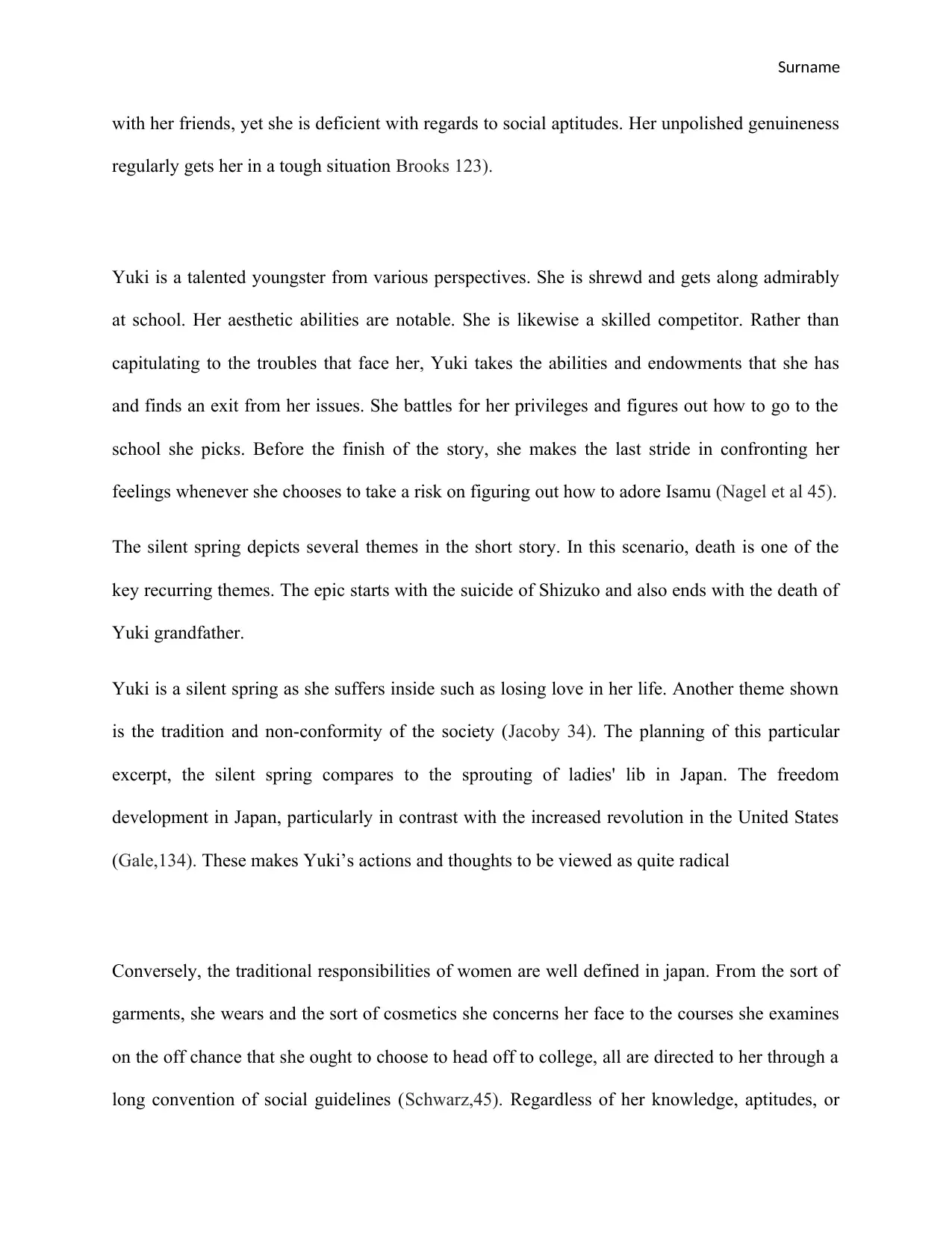
Surname
with her friends, yet she is deficient with regards to social aptitudes. Her unpolished genuineness
regularly gets her in a tough situation Brooks 123).
Yuki is a talented youngster from various perspectives. She is shrewd and gets along admirably
at school. Her aesthetic abilities are notable. She is likewise a skilled competitor. Rather than
capitulating to the troubles that face her, Yuki takes the abilities and endowments that she has
and finds an exit from her issues. She battles for her privileges and figures out how to go to the
school she picks. Before the finish of the story, she makes the last stride in confronting her
feelings whenever she chooses to take a risk on figuring out how to adore Isamu (Nagel et al 45).
The silent spring depicts several themes in the short story. In this scenario, death is one of the
key recurring themes. The epic starts with the suicide of Shizuko and also ends with the death of
Yuki grandfather.
Yuki is a silent spring as she suffers inside such as losing love in her life. Another theme shown
is the tradition and non-conformity of the society (Jacoby 34). The planning of this particular
excerpt, the silent spring compares to the sprouting of ladies' lib in Japan. The freedom
development in Japan, particularly in contrast with the increased revolution in the United States
(Gale,134). These makes Yuki’s actions and thoughts to be viewed as quite radical
Conversely, the traditional responsibilities of women are well defined in japan. From the sort of
garments, she wears and the sort of cosmetics she concerns her face to the courses she examines
on the off chance that she ought to choose to head off to college, all are directed to her through a
long convention of social guidelines (Schwarz,45). Regardless of her knowledge, aptitudes, or
with her friends, yet she is deficient with regards to social aptitudes. Her unpolished genuineness
regularly gets her in a tough situation Brooks 123).
Yuki is a talented youngster from various perspectives. She is shrewd and gets along admirably
at school. Her aesthetic abilities are notable. She is likewise a skilled competitor. Rather than
capitulating to the troubles that face her, Yuki takes the abilities and endowments that she has
and finds an exit from her issues. She battles for her privileges and figures out how to go to the
school she picks. Before the finish of the story, she makes the last stride in confronting her
feelings whenever she chooses to take a risk on figuring out how to adore Isamu (Nagel et al 45).
The silent spring depicts several themes in the short story. In this scenario, death is one of the
key recurring themes. The epic starts with the suicide of Shizuko and also ends with the death of
Yuki grandfather.
Yuki is a silent spring as she suffers inside such as losing love in her life. Another theme shown
is the tradition and non-conformity of the society (Jacoby 34). The planning of this particular
excerpt, the silent spring compares to the sprouting of ladies' lib in Japan. The freedom
development in Japan, particularly in contrast with the increased revolution in the United States
(Gale,134). These makes Yuki’s actions and thoughts to be viewed as quite radical
Conversely, the traditional responsibilities of women are well defined in japan. From the sort of
garments, she wears and the sort of cosmetics she concerns her face to the courses she examines
on the off chance that she ought to choose to head off to college, all are directed to her through a
long convention of social guidelines (Schwarz,45). Regardless of her knowledge, aptitudes, or
⊘ This is a preview!⊘
Do you want full access?
Subscribe today to unlock all pages.

Trusted by 1+ million students worldwide
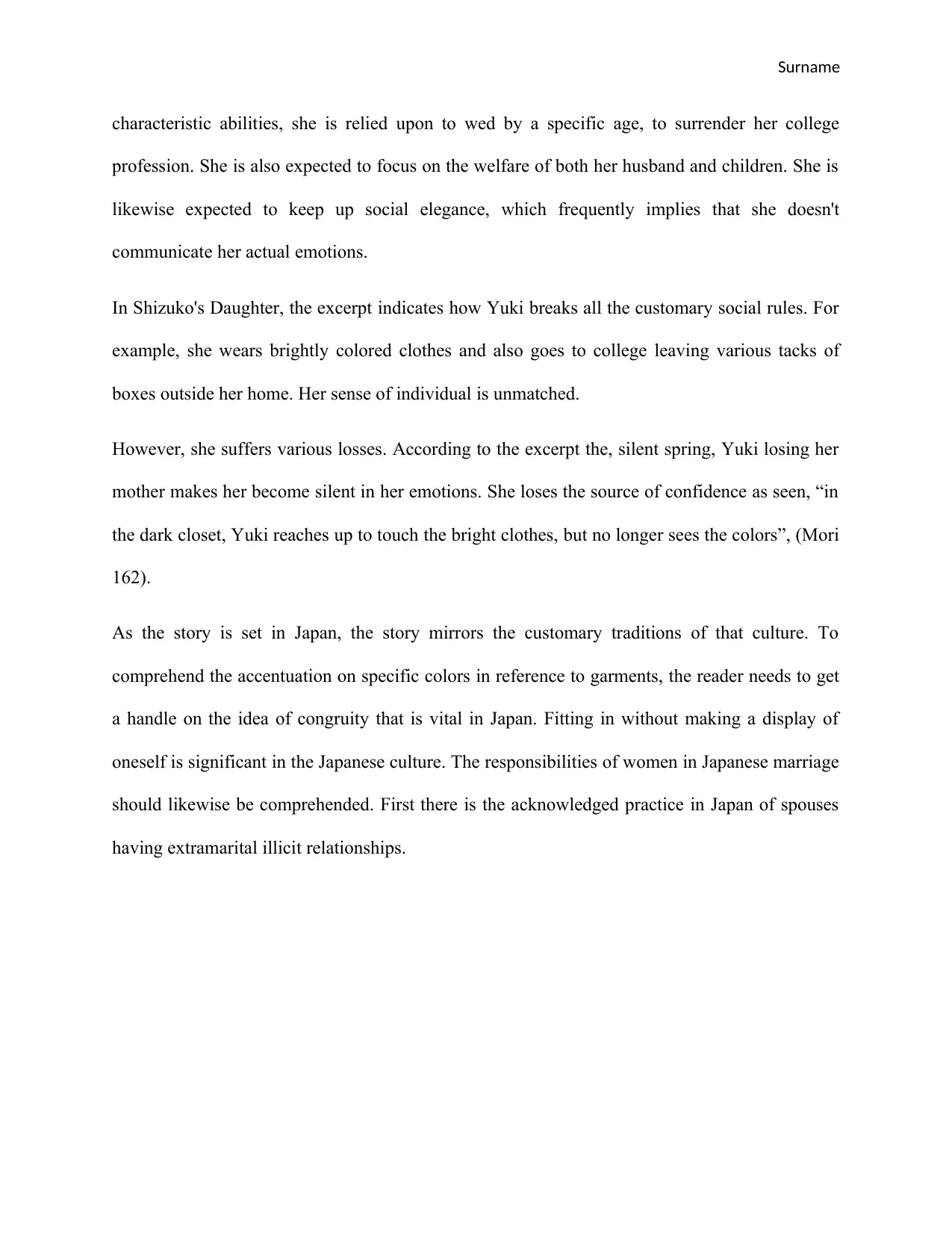
Surname
characteristic abilities, she is relied upon to wed by a specific age, to surrender her college
profession. She is also expected to focus on the welfare of both her husband and children. She is
likewise expected to keep up social elegance, which frequently implies that she doesn't
communicate her actual emotions.
In Shizuko's Daughter, the excerpt indicates how Yuki breaks all the customary social rules. For
example, she wears brightly colored clothes and also goes to college leaving various tacks of
boxes outside her home. Her sense of individual is unmatched.
However, she suffers various losses. According to the excerpt the, silent spring, Yuki losing her
mother makes her become silent in her emotions. She loses the source of confidence as seen, “in
the dark closet, Yuki reaches up to touch the bright clothes, but no longer sees the colors”, (Mori
162).
As the story is set in Japan, the story mirrors the customary traditions of that culture. To
comprehend the accentuation on specific colors in reference to garments, the reader needs to get
a handle on the idea of congruity that is vital in Japan. Fitting in without making a display of
oneself is significant in the Japanese culture. The responsibilities of women in Japanese marriage
should likewise be comprehended. First there is the acknowledged practice in Japan of spouses
having extramarital illicit relationships.
characteristic abilities, she is relied upon to wed by a specific age, to surrender her college
profession. She is also expected to focus on the welfare of both her husband and children. She is
likewise expected to keep up social elegance, which frequently implies that she doesn't
communicate her actual emotions.
In Shizuko's Daughter, the excerpt indicates how Yuki breaks all the customary social rules. For
example, she wears brightly colored clothes and also goes to college leaving various tacks of
boxes outside her home. Her sense of individual is unmatched.
However, she suffers various losses. According to the excerpt the, silent spring, Yuki losing her
mother makes her become silent in her emotions. She loses the source of confidence as seen, “in
the dark closet, Yuki reaches up to touch the bright clothes, but no longer sees the colors”, (Mori
162).
As the story is set in Japan, the story mirrors the customary traditions of that culture. To
comprehend the accentuation on specific colors in reference to garments, the reader needs to get
a handle on the idea of congruity that is vital in Japan. Fitting in without making a display of
oneself is significant in the Japanese culture. The responsibilities of women in Japanese marriage
should likewise be comprehended. First there is the acknowledged practice in Japan of spouses
having extramarital illicit relationships.
Paraphrase This Document
Need a fresh take? Get an instant paraphrase of this document with our AI Paraphraser
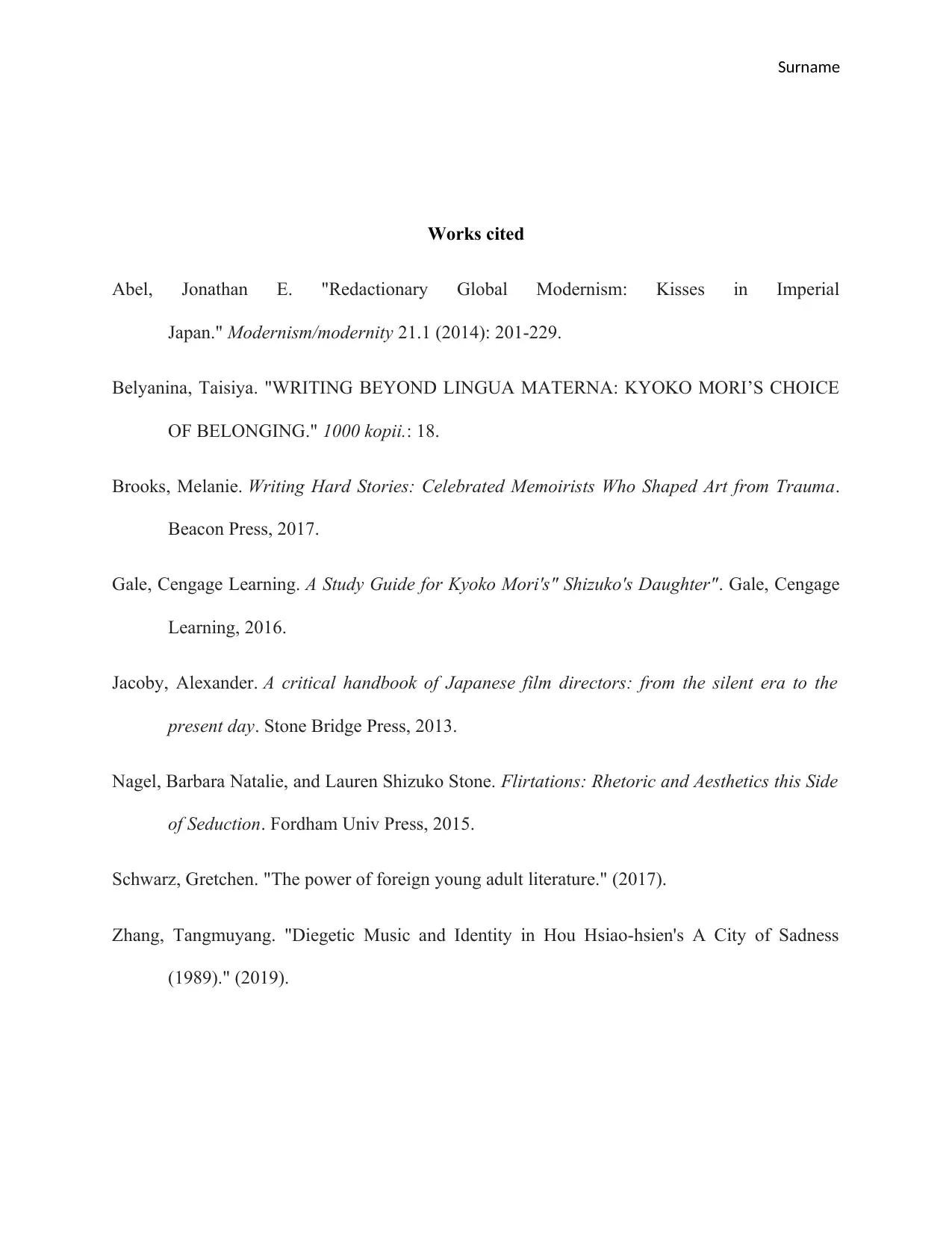
Surname
Works cited
Abel, Jonathan E. "Redactionary Global Modernism: Kisses in Imperial
Japan." Modernism/modernity 21.1 (2014): 201-229.
Belyanina, Taisiya. "WRITING BEYOND LINGUA MATERNA: KYOKO MORI’S CHOICE
OF BELONGING." 1000 kopii.: 18.
Brooks, Melanie. Writing Hard Stories: Celebrated Memoirists Who Shaped Art from Trauma.
Beacon Press, 2017.
Gale, Cengage Learning. A Study Guide for Kyoko Mori's" Shizuko's Daughter". Gale, Cengage
Learning, 2016.
Jacoby, Alexander. A critical handbook of Japanese film directors: from the silent era to the
present day. Stone Bridge Press, 2013.
Nagel, Barbara Natalie, and Lauren Shizuko Stone. Flirtations: Rhetoric and Aesthetics this Side
of Seduction. Fordham Univ Press, 2015.
Schwarz, Gretchen. "The power of foreign young adult literature." (2017).
Zhang, Tangmuyang. "Diegetic Music and Identity in Hou Hsiao-hsien's A City of Sadness
(1989)." (2019).
Works cited
Abel, Jonathan E. "Redactionary Global Modernism: Kisses in Imperial
Japan." Modernism/modernity 21.1 (2014): 201-229.
Belyanina, Taisiya. "WRITING BEYOND LINGUA MATERNA: KYOKO MORI’S CHOICE
OF BELONGING." 1000 kopii.: 18.
Brooks, Melanie. Writing Hard Stories: Celebrated Memoirists Who Shaped Art from Trauma.
Beacon Press, 2017.
Gale, Cengage Learning. A Study Guide for Kyoko Mori's" Shizuko's Daughter". Gale, Cengage
Learning, 2016.
Jacoby, Alexander. A critical handbook of Japanese film directors: from the silent era to the
present day. Stone Bridge Press, 2013.
Nagel, Barbara Natalie, and Lauren Shizuko Stone. Flirtations: Rhetoric and Aesthetics this Side
of Seduction. Fordham Univ Press, 2015.
Schwarz, Gretchen. "The power of foreign young adult literature." (2017).
Zhang, Tangmuyang. "Diegetic Music and Identity in Hou Hsiao-hsien's A City of Sadness
(1989)." (2019).
1 out of 5
Your All-in-One AI-Powered Toolkit for Academic Success.
+13062052269
info@desklib.com
Available 24*7 on WhatsApp / Email
![[object Object]](/_next/static/media/star-bottom.7253800d.svg)
Unlock your academic potential
Copyright © 2020–2026 A2Z Services. All Rights Reserved. Developed and managed by ZUCOL.

